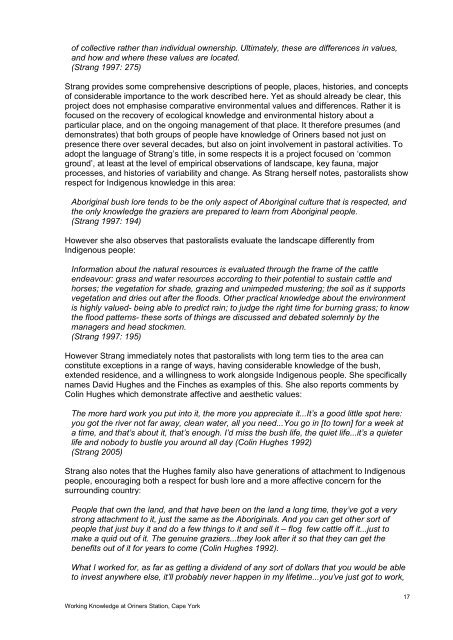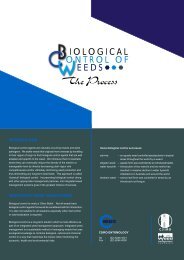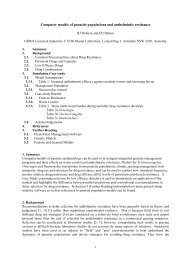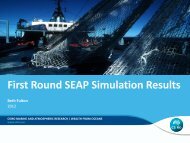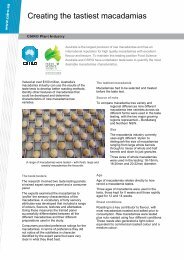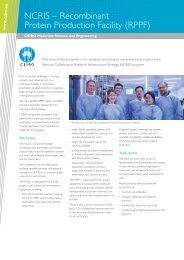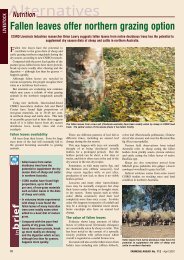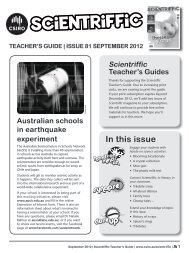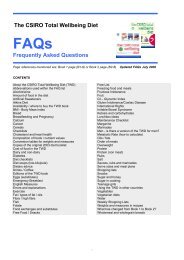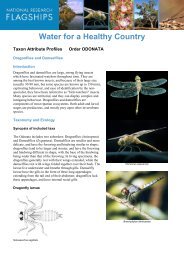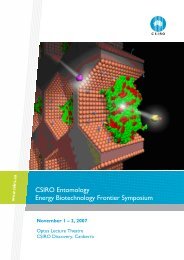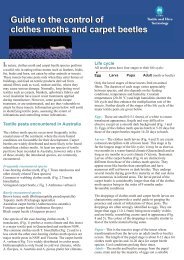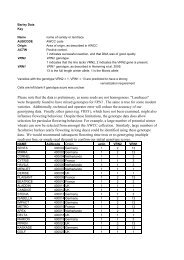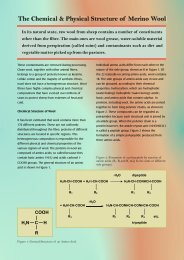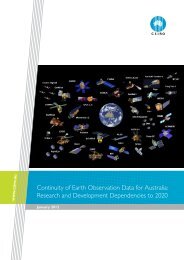WfHC - cover page (not to be used with pre-printed report ... - CSIRO
WfHC - cover page (not to be used with pre-printed report ... - CSIRO
WfHC - cover page (not to be used with pre-printed report ... - CSIRO
Create successful ePaper yourself
Turn your PDF publications into a flip-book with our unique Google optimized e-Paper software.
of collective rather than individual ownership. Ultimately, these are differences in values,<br />
and how and where these values are located.<br />
(Strang 1997: 275)<br />
Strang provides some com<strong>pre</strong>hensive descriptions of people, places, his<strong>to</strong>ries, and concepts<br />
of considerable importance <strong>to</strong> the work descri<strong>be</strong>d here. Yet as should already <strong>be</strong> clear, this<br />
project does <strong>not</strong> emphasise comparative environmental values and differences. Rather it is<br />
foc<strong>used</strong> on the re<strong>cover</strong>y of ecological knowledge and environmental his<strong>to</strong>ry about a<br />
particular place, and on the ongoing management of that place. It therefore <strong>pre</strong>sumes (and<br />
demonstrates) that both groups of people have knowledge of Oriners based <strong>not</strong> just on<br />
<strong>pre</strong>sence there over several decades, but also on joint involvement in pas<strong>to</strong>ral activities. To<br />
adopt the language of Strang‟s title, in some respects it is a project foc<strong>used</strong> on „common<br />
ground‟, at least at the level of empirical observations of landscape, key fauna, major<br />
processes, and his<strong>to</strong>ries of variability and change. As Strang herself <strong>not</strong>es, pas<strong>to</strong>ralists show<br />
respect for Indigenous knowledge in this area:<br />
Aboriginal bush lore tends <strong>to</strong> <strong>be</strong> the only aspect of Aboriginal culture that is respected, and<br />
the only knowledge the graziers are <strong>pre</strong>pared <strong>to</strong> learn from Aboriginal people.<br />
(Strang 1997: 194)<br />
However she also observes that pas<strong>to</strong>ralists evaluate the landscape differently from<br />
Indigenous people:<br />
Information about the natural resources is evaluated through the frame of the cattle<br />
endeavour: grass and water resources according <strong>to</strong> their potential <strong>to</strong> sustain cattle and<br />
horses; the vegetation for shade, grazing and unimpeded mustering; the soil as it supports<br />
vegetation and dries out after the floods. Other practical knowledge about the environment<br />
is highly valued- <strong>be</strong>ing able <strong>to</strong> <strong>pre</strong>dict rain; <strong>to</strong> judge the right time for burning grass; <strong>to</strong> know<br />
the flood patterns- these sorts of things are discussed and debated solemnly by the<br />
managers and head s<strong>to</strong>ckmen.<br />
(Strang 1997: 195)<br />
However Strang immediately <strong>not</strong>es that pas<strong>to</strong>ralists <strong>with</strong> long term ties <strong>to</strong> the area can<br />
constitute exceptions in a range of ways, having considerable knowledge of the bush,<br />
extended residence, and a willingness <strong>to</strong> work alongside Indigenous people. She specifically<br />
names David Hughes and the Finches as examples of this. She also <strong>report</strong>s comments by<br />
Colin Hughes which demonstrate affective and aesthetic values:<br />
The more hard work you put in<strong>to</strong> it, the more you ap<strong>pre</strong>ciate it...It‟s a good little spot here:<br />
you got the river <strong>not</strong> far away, clean water, all you need...You go in [<strong>to</strong> <strong>to</strong>wn] for a week at<br />
a time, and that‟s about it, that‟s enough. I‟d miss the bush life, the quiet life...it‟s a quieter<br />
life and nobody <strong>to</strong> bustle you around all day (Colin Hughes 1992)<br />
(Strang 2005)<br />
Strang also <strong>not</strong>es that the Hughes family also have generations of attachment <strong>to</strong> Indigenous<br />
people, encouraging both a respect for bush lore and a more affective concern for the<br />
surrounding country:<br />
People that own the land, and that have <strong>be</strong>en on the land a long time, they‟ve got a very<br />
strong attachment <strong>to</strong> it, just the same as the Aboriginals. And you can get other sort of<br />
people that just buy it and do a few things <strong>to</strong> it and sell it – flog few cattle off it...just <strong>to</strong><br />
make a quid out of it. The genuine graziers...they look after it so that they can get the<br />
<strong>be</strong>nefits out of it for years <strong>to</strong> come (Colin Hughes 1992).<br />
What I worked for, as far as getting a dividend of any sort of dollars that you would <strong>be</strong> able<br />
<strong>to</strong> invest anywhere else, it‟ll probably never happen in my lifetime...you‟ve just got <strong>to</strong> work,<br />
Working Knowledge at Oriners Station, Cape York<br />
17


